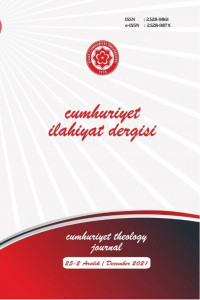Klasik Arap Edebiyatı Kaynaklarında Ahlak-Yaratılış Karşılaştırması ve Şiirde Bunun Bir Motif Olarak Kullanılmasına Dair Bir Alan Taraması
A Comparison of Morality and Creation in Classical Arabic Literature and an Eval-uation of Its Use as a Motif in Poetry
Author(s): Adnan ArslanSubject(s): Language studies, Ethics / Practical Philosophy, Theology and Religion
Published by: Cumhuriyet Üniversitesi İlahyat Fakültesi
Keywords: Arabic Language Rhetoric; Classical Arabic literature; Naturalness; Naturality;Morality;
Summary/Abstract: There are many moral values that the Arab writers have written about either in prose or poetry. This emphasis on morality in classical Arabic literature has also been the subject of many academic studies. The abundance of the literary material in this field has attracted the attention of researchers. One of these is the emphasis on "naturalness" which we have seen in classical Arabic literature. In the Arab society which social ties are very strong the moral values have been summarized with the concept of al-murūah/chivalry over time. In these sources that is including poems, parables and anecdotes about morality allthings on the moral values are brought together. Hereunder the main thing in the moral maturity is the naturality. Criticism of ostensible behaviors has taken place in an important part of these works. For example, ancient perception of morality is a predestination that comes from creation has found its response in Arabic poetry. Many Arab poets have stated that one's innate character will beat and the reason will be defeated. On the other hand, some poets tried to establish a balance between character and wisdom. Accordingly, it has been stated that people are innately inclined to falses but they also have the potential to restrain their innate evil tendencies with the ability of mind given to them. These poets liked to explain this balance through the simile stating he ambitious horse that wants to run at full speed is restrained with a bit. According to this simile the man is like a person on the back of a raging horse with the evil inclinations cultivated in his nature. The soul he carries wants to take him wherever it wishes. However, he has a mind that is like a bridle in return for the soul inside him. On the other hand, when we look at the encyclopedic sources of Arabic proverbs we see that there are proverbs comparing many moral attributes with animals. In Turkish proverbs, cunning is identified with the fox and industriousness with the ant, and in Arabic proverbs a very rich human character-animal pairings stand out. These proverbs are based on the idea that people's character is the product of nature. Because each animal species has appreciated characteristics and these features occur without learning and education. In addition, the issue of the naturalness of morality was also used for the purpose of praise and satire in the classical Arabic poets. The poet makes his reproach or anger towards someone through his character. When describing his lover he states that the beauties that adorn him come from creation. Therefore, it can be said that the emphasises of character/nature/temperament in the poems in which these and similar emotions are aroused, are the motifs that serve the purpose of the poet. Finally Arab writers have offered many recommendations in literary form on issues such as brotherhood, solidarity and cooperation for the healthy continuity of social relations in the Muslim society, and they have included anecdotes and poems within the framework of the subject. The study is mainly based on the descriptive method, however, the way the authors handled the subject is analysed when it is deemed to be appropriate. Considering that there is no specific study in Turkish and Arabic literature within the framework of the present study, it is aimed to investigate the literary material in the subject in question.
Journal: Cumhuriyet İlahiyat Dergisi
- Issue Year: 25/2021
- Issue No: 2
- Page Range: 941-956
- Page Count: 16
- Language: Turkish

